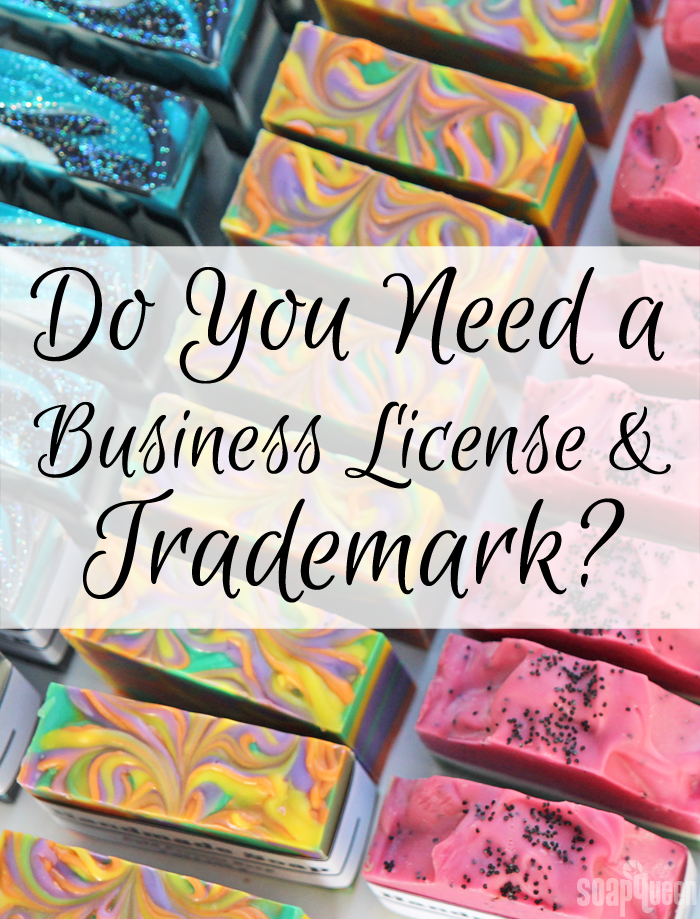
Starting a small business can seem daunting for many reasons. There are so many numbers to crunch, and demands to meet. There are also the legal aspects of small business. And let’s be honest, unless you’re a lawyer or have access to one, it can be tricky to make sense of all that. One of the most common questions I get from soapers who are thinking about turning their hobby into a business, is how to make it “official.” Do you need to register somewhere, or need a license? Is a trademark essential? Let’s talk about it.
First of all, congrats! You have want to start a business, and have a business name. Sometimes coming up with a business name is the hardest part. Now that you’re ready to make it official, the first step is registering the business name in your state with a business license. This process ensures there isn’t another business in your state with the same name, or something extremely similar. To get started, I recommend searching around online to see if anybody else is using your desired business name.

A business license protects you from other businesses creating a business with the same name as yours (or something extremely similar). Many states have an online search function to check if a business name is already registered (for example, see Washington’s Business License Lookup here). Keep in mind, registering your business only protects your business name in your state. The process of getting a state business license varies widely from state to state, and each state has different rules and guidelines. To learn more about the state permits you need, find your state here.
When applying for a business license, you will need to choose what type of business you’re registering as. The Small Business Administration has an overview about the different types of business structures (corporation, sole proprietorship, cooperative, etc). A sole proprietorship is the most common type of small business. According to the Small Business Administration, a sole proprietorship is “an unincorporated business owned and run by one individual with no distinction between the business and you, the owner. You are entitled to all profits and are responsible for all your business’s debts, losses and liabilities.” Amanda of Lovin’ Soap has a great article that dives a little bit deeper into two popular business structures for new businesses.
Another piece of making your business “official” is quickly grabbing your website domain. Even if you don’t plan on creating a website now (or ever) you want ownership of your business name online. I also highly recommend creating accounts of various social media channels like Instagram, Pinterest, Facebook and Twitter. You don’t have to be active on all these sites (although I recommend it!) but that way you have the most control over your business name online. For example, I didn’t get on Snapchat early-on because when it came out, it didn’t seem relevant to business. Then when their focus changed it was too late to get the name ‘brambleberry’ and the person that does have it (a) isn’t using it but (b) also doesn’t want to give it to me. So, we are ‘Bramble-Berry’ on Snapchat. Moral of the story, if you have a name, grab it everywhere as soon as you can.
 Make sure to register your name on various social media channels ASAP, even if you don’t plan on using it.
Make sure to register your name on various social media channels ASAP, even if you don’t plan on using it.
After you have a business licence, the next level of legal protection is a trademark. A trademark protects a word, symbol or phrase on a federal level by the U.S. Patent and Trademark Office. A trademark is not essential for owning and operating a business. Whether or not you get a trademark will depend on the level of protection you desire. Some small business names are sufficiently protected at the state level. But if you want exclusive rights for the name of your business or product in all 50 states, you need to apply for a trademark. A federal trademark is important if your business will do business across state lines. In terms of soap businesses, this happens often if you sell online.
While the process of registering your business name on a state level is usually fairly easy, registering for a trademark is trickier. It can take a long time, and can also be expensive. The process can be done online via the Trademark Electronic Application System (TEAS). Get a breakdown of the trademark application process here. In general, obtaining a trademark usually takes about a year. Once you have a trademark, it is good for 10 years. After 10 years, you can renew your registration.
Although it’s not required, many applicants choose to hire a trademark attorney to guide them through the application process. I like Andrea Evans who knows soap and small business. Listen to her podcast with Indie Business Network here. When I first applied for a trademark for Bramble Berry, I went the DIY route to save fees on lawyers. This meant I did my own paperwork, and I did it wrong. The errors in the paperwork resulted in my application being denied. Afterwards I hired a lawyer, but it took more work and money to untangle the mess I had made. I definitely learned my lesson; DIY isn’t always the best route to take when it comes to legal processes. In the last decade, I’ve added several trademarks in multiple countries that Bramble Berry does business in, such as Australia, China and Canada.
 During my early days of selling soap, I didn’t have a trademark. Many small businesses don’t obtain a trademark for several years.
During my early days of selling soap, I didn’t have a trademark. Many small businesses don’t obtain a trademark for several years.
So, which is right for you? This is a question only you can answer. It will depend on how “serious” your soaping business is, your plans for the future and how protected you’d like your business to be. If you are going to sell, you need to get a business license. It’s easy to do, and there are many benefits. One of the largest benefits, besides making you legal, is it shows you are serious about your business. Customers may feel more confident in buying products from a licensed business, and potential partners may be more likely to work with you. A business license also gives you a certain amount of protection, and is important for tax purposes.
Should you get a trademark? I’m not a lawyer (you should talk to a lawyer about any legal advice) so everything here is based on my experience. Many small businesses choose to get a trademark eventually (I did very early on, despite the hiccups on my poorly done DIY application). It may not make sense for your business in the first few months, first year, or even first few years of business. This is a decision that every business owner must make for themselves. However, I do recommend applying for a trademark for your business name or any unique product or product name that you’d like to make sure no one else will use. In general, when financially feasible, obtaining a trademark sooner rather than later is better.